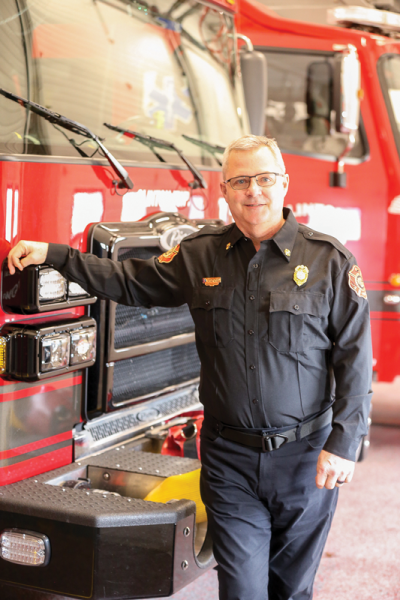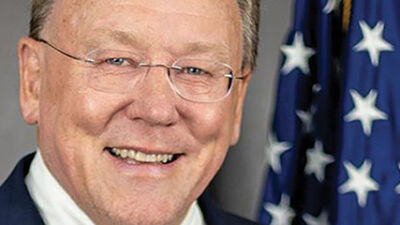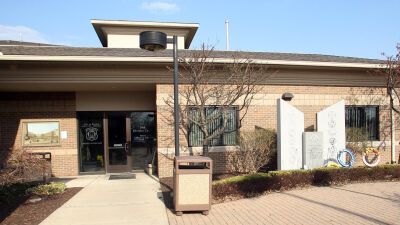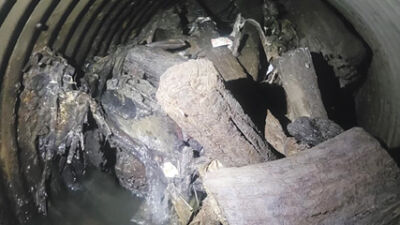
Tim Duncan will retire from his position as chief of the Clinton Township Fire Department this spring.
Photo by Patricia O’Blenes
CLINTON TOWNSHIP — After 25 with the department, Clinton Township’s fire chief is calling it quits.
“It seems like it’s been a long time coming, but now that it’s approaching in another 13 weeks or so, it’s starting to become real,” said Tim Duncan. “Things get so busy that you cruise along and don’t really anticipate that it’s happening, and now you start seeing the motions get in place for the replacement of my position and it starts to become real. It’s exciting and a little melancholy at times, leaving a lot of my life behind here.”
Originally from Fraser, Duncan did not start out as a firefighter. He attended Michigan State University and spent around a decade in the business world with GMAC (now Ally Bank), but began to have a change of heart about halfway through.
“I wanted to change. I wanted to do something that I felt was more beneficial to the communities that I lived in and decided to start pursuing some of the public service type things,” Duncan said. “Initially, I thought I wanted to go the police officer route and ended up deciding against that pretty much in my mid-to-late 20s. Then, I decided to pursue the firefighting side of things. A little more difficult at that time in my life because I was working a 40-hour job with two children, so luckily there was an ability to go (to classes) at night and on the weekends.”
After completing firefighting, EMT and paramedic courses, Duncan was able to get his first firefighting job with the Fraser Fire Department. But even at that early point Duncan knew he wanted to be a Clinton Township firefighter.
“They just seemed to be one of the departments on the upswing,” Duncan said. “I don’t know if, at the time I hired in, they were the most populated township in the state, but certainly now they are. I just felt they had the tools in place to promote a really good career.”
His dream became a reality in May 1999 as he was hired by the Clinton Township Fire Department, entering at the same time as fellow outgoing Deputy Chief Aaron Schmid. Duncan spent 18 years with the department before becoming chief. Of those pre-chief years, 16 were spent working with the union, giving Duncan experience with the political aspect of fire leadership.
Duncan’s time with the department began at the start of the very upswing he predicted for it. The department was a low-rated “firefighting medical first response department” — the lowest medical provider tier — but quickly ramped up to become an EMT department and, within a few years, a top-level paramedic department. This sudden improvement in medical capabilities paired with the department’s “aggressive” firefighting approach to build the department into a solid system for the 2000s and 2010s. The department’s demands grew in that time as well, going from handing 2,000 runs a year to over 15,000 runs while maintaining a similar level of staff.
“It speaks testament to the people on the street that are able to do this job and do it in a proper fashion, in a professional fashion,” Duncan said.
Duncan’s tenure as chief began in 2018. Just over a year later he and his department faced its biggest challenge yet: COVID-19.
“A very much trying time period for a couple years trying to get through that here with the department,” Duncan said. “A lot of decisions had to be made; you’re always looking to make them from a safety standpoint. Not everyone agrees with them all the time, but you’ve got to be quick to make decisions and stand by them.”
Duncan’s time as the chief saw a number of positive changes as well. Dispatching was switched over from the township to the county’s COMTEC center, integrating the department’s communication network with the township. He also noticed a large shift in the way emergency professions handle their mental health and well-being.
“We’ve always seen bad things, traumatic things and we react to them in a different way sometimes,” Duncan said. “Some people may have a challenge sometimes, but it’s really just a defense mechanism to handle some of the horror that you see.”
Working with the Clinton Township Board of Trustees, contentious as it has been, was largely positive in Duncan’s eyes.
“They’re pretty good and aggressive,” Duncan said. “They ask the tough questions but usually we’ve gotten overwhelming support for them for things we wanted to do in the areas of apparatus purchases, (and) building improvements. Our big goal here was to basically take care of all of the infrastructure issues that face the fire department, and I think we’ve achieved 90-plus percent of that in the last six years to put our department in the best state going forward for the next administration to come on and be able to focus on the personnel side, the running of the department.”
After having worked in the fire service for the better part of his life, Duncan has noticed that the service redefines itself about every five years and that the next fire administration will be the one handling that shift.
“We’re at the cusp right now of what is the service model that each individual community is looking for,” Duncan said. “I think it’s going to take the powers that be to sit at the table and ask, ‘Where is the fire service going to go in the future?’ We’re supposed to be an emergency service provider, but the world has changed to where we’re providing a lot more than just emergency services. We’re (providing) nonemergency services, basic services (and) health and well-being services right now. There’s a tipping point of how much can any particular department handle at times because 15,000 runs is kind of putting us towards our max. You’re exhausting your personnel, you’re exhausting your apparatus. You start getting things breaking down when you’re running as much as we do.”
As Clinton Township assembles a committee to find a new chief, Duncan has his sights set for his post-department life starting mid-May. The Harrison Township resident serves on the township’s Planning Commission and was recently appointed to serve on its Civil Service Commission, and Duncan plans to maintain his connections to the fire world by getting involved with a fire department promotions agency and possibly getting into fire education.
“I just look at it as I’m retiring from this portion of my career and we’re looking to move on to whatever opportunities present themselves down the line,” Duncan said.
 Publication select ▼
Publication select ▼





















